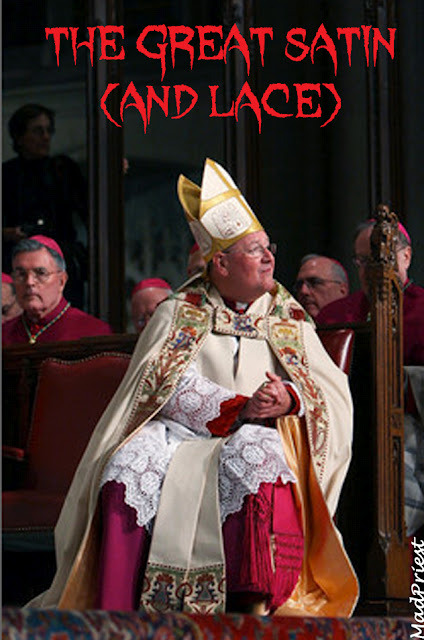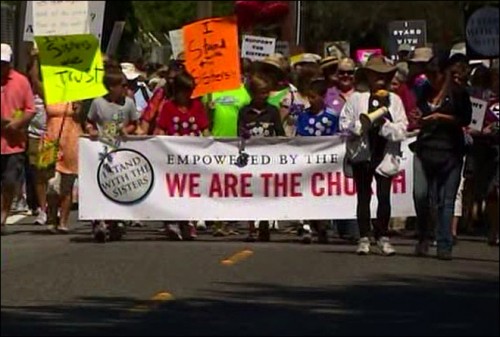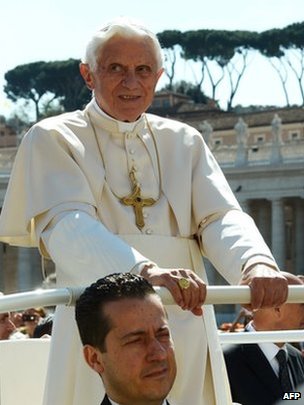If you read nothing else this week, read this:
The Catholic Church’s lost revolution
“The magnificent Roman Catholic Church, a millennial font of reasoned faith and aesthetic genius, is on the road to becoming yet another fundamentalist cult.”

The Gay Catholic Priests' Blog
If you read nothing else this week, read this:
“The magnificent Roman Catholic Church, a millennial font of reasoned faith and aesthetic genius, is on the road to becoming yet another fundamentalist cult.”
Italian Cardinal Carlo Maria Martini has described the Roman Catholic Church as being “200 years behind” the times.
The cardinal died on Friday, aged 85.
Italian newspaper Corriere della Sera has published his last interview, recorded in August, in which he said: “The Church is tired… our prayer rooms are empty.”
Martini, once tipped as a future pope, urged the Church to recognise its errors and to embark on a radical path of change, beginning with the Pope.
Cardinal Martini
Thousands of people have been filing past his coffin at Milan’s cathedral, where he was archbishop for more than 20 years.
The cardinal, who had retired from the post in 2002, suffering from Parkinson’s Disease, is to be buried on Monday.
‘Old culture’
Martini, a popular figure with liberal stances on many issues, commanded great respect from both Pope John Paul II and his successor Pope Benedict XVI.
The cardinal – a member of the Jesuit religious order – was often critical in his writings and comments on Church teaching, says the BBC’s David Willey in Rome.
He was a courageous and outspoken figure during the years he headed Europe’s largest Catholic diocese, our correspondent says.
Cardinal Martini gave his last interview to a fellow Jesuit priest, Georg Sporschill, and to a journalist at the beginning of August when he knew his death was approaching.
The cardinal had returned to Italy from Jerusalem, where he had settled on retirement in 2002 to continue his biblical studies.
Catholics lacked confidence in the Church, he said in the interview. “Our culture has grown old, our churches are big and empty and the church bureaucracy rises up, our religious rites and the vestments we wear are pompous.”
Unless the Church adopted a more generous attitude towards divorced persons, it will lose the allegiance of future generations, the cardinal added. The question, he said, is not whether divorced couples can receive holy communion, but how the Church can help complex family situations.
And the advice he leaves behind to conquer the tiredness of the Church was a “radical transformation, beginning with the Pope and his bishops”.
“The child sex scandals oblige us to undertake a journey of transformation,” Cardinal Martini says, referring to the child sex abuse that has rocked the Catholic Church in the past few years.
He was not afraid, our correspondent adds, to speak his mind on matters that the Vatican sometimes considered taboo, including the use of condoms to fight Aids and the role of women in the Church.
In 2008, for example, he criticised the Church’s prohibition of birth control, saying the stance had likely driven many faithful away, and publicly stated in 2006 that condoms could “in some situations, be a lesser evil”.
Complete Article HERE!
That’s what an in-depth, investigative piece in the Economist called the state of finances in the Catholic Church in America: an unholy mess.
It’s hard to decide what is most horrifying in this report of financial mismanagement, which looks at data made public through bankruptcy proceedings in several dioceses:
Similar financial mismanagement was reported in “Render Unto Rome: The Secret Life of Money in the Catholic Church” by Jason Berry, who was quoted in the Economist article. It’s why more and more Catholics are considering whether this is an institution worthy of their donations.
Complete Article HERE!
Over the years, Patricia Patterson thought about joining protest marches in support of women’s rights or against war. But the cause that finally got her to take to the streets was nuns.
 “It baffles me that a group of women who are among the … most compassionate are being, frankly, picked on by the Vatican,” Patterson said Sunday. She joined a throng of nearly 500 people who marched in support of the nuns’ group recently rebuked by the Catholic Church for promoting “radical feminist themes” at odds with official doctrine.
“It baffles me that a group of women who are among the … most compassionate are being, frankly, picked on by the Vatican,” Patterson said Sunday. She joined a throng of nearly 500 people who marched in support of the nuns’ group recently rebuked by the Catholic Church for promoting “radical feminist themes” at odds with official doctrine.
Patterson carried a picture of her aunt, a nun who had a major influence on her life. Other marchers carried flowers and sang hymns as they walked from Volunteer Park on Capitol Hill to St. James Cathedral, seat of the Archdiocese of Seattle.
But Seattle Archbishop J. Peter Sartain wasn’t home. He was in St. Louis for meetings with the Leadership Conference of Women Religious, an umbrella group that includes about 80 percent of women’s religious orders in the United States.
The Vatican put Sartain in charge of revamping the Leadership Conference to bring its practices more in line with Catholic orthodoxy.
After a four-day conference that concluded Friday, the nuns agreed to talk with Sartain but said they would not “compromise the integrity” of their mission.
Sartain praised the nuns’ work and contributions in a statement issued Saturday. “They deserve our respect, our support, our thanks and our prayers,” he wrote. He said he is committed to working with the Leadership Council in “atmosphere of prayer and respectful dialogue.”
Sister Cathy Beckley, who was cheered as she dashed back and forth in her red baseball cap, said the Vatican’s attack was hurtful to women who have devoted their lives to caring for people on society’s fringes.
In a report issued in April, Catholic Church officials chided the nuns and sisters for resisting some church teachings, including those that prohibit birth control and same-sex relationships.
Beckley, a Seattle social worker and member of the Sisters of the Holy Names of Jesus and Mary, said that when she worked on the streets with the poor and homeless, she never asked about their private lives.
Sunday’s turnout gave her hope that many Catholics agree with the sisters’ approach and value their service. “Clearly, a very significant segment of the church here in the U.S. and around the world is more progressive.”
Among their causes, the sisters of the Leadership Conference mounted a “Nuns on the Bus” tour this summer opposing cuts in federal spending for social and health services proposed by Wisconsin Rep. Paul Ryan — now running mate to Republican presidential candidate Mitt Romney. Catholic bishops also echoed those concerns.
Beyond politics, the split between the sisters and the Vatican reflects the struggle between Catholics who want the church to adapt to modern realities — such as the fact that the vast majority of Catholic women in America use birth control — and those who seek a more traditional path, several marchers said.
Christy Higgins, of Seattle, was a youngster in Catholic school when the Vatican II changes were adopted in the 1960s. She recalls her teachers trading their habits for street clothes, and she embraced the more open and inclusive outlook.
“The church is all of us, not just the Vatican, the bishops and the cardinals,” Higgins said, her shirt pinned with more than a dozen “I Stand with the Sisters” buttons.
The slogan is also the name of the Seattle group that organized Sunday’s march. “We were so upset about how the church hierarchy is treating the sisters,” said Gretchen Gundrum, a co-founder.
It’s easy for ivory-tower leaders — all of whom are men — to discount the hard decisions people face in their day-to-day lives, Gundrum said. “The nuns see the complexity. Morality is not black-and-white, no matter what somebody says.”
The same tensions have always been present in the Catholic Church, Gundrum added. Church leaders denounced Galileo for claiming the Earth revolves around the sun. They finally admitted he was right — nearly 400 years later.
“Our group hopes to shorten the amount of time it takes for them to come around,” Gundrum said.
Complete Article HERE!
The former butler to Pope Benedict XVI will stand trial for stealing confidential papers and leaking them to the press, a magistrate has ruled.
 Paolo Gabriele was arrested in May after police found confidential documents at his Vatican flat.
Paolo Gabriele was arrested in May after police found confidential documents at his Vatican flat.
He has been charged with aggravated theft, including stealing a 100,000-euro (£78,000) cheque, while a computer analyst faces complicity charges.
The Vatican says it will continue to investigate the leaks.
Mr Gabriele admitted he was the source of leaked letters published in a controversial book by an Italian investigative journalist in May.
The bestseller, entitled His Holiness, revealed private correspondence between the Pope and his personal secretary discussing corruption and malpractice among Vatican administrators.
The Vatican called the book “criminal” and vowed to take legal action against the author, publisher, and whoever leaked the documents.
‘Evil everywhere’
Mr Gabriele told investigators he acted because he saw “evil and corruption everywhere in the church” while the pope was “not sufficiently informed”.
As the Pope’s butler and personal assistant, Mr Gabriele was one of a select few lay people with access to the papal apartments.
If convicted, he faces up to six years in prison.
The 46-year-old has been living under house arrest at his family’s flat in Vatican City, where police discovered a stash of confidential correspondence taken from the Pope’s Secretariat of State.
As the Vatican has no jail, Mr Gabriele would probably serve his sentence in an Italian prison under an agreement between Italy and the Vatican, Italian media reported.
The Pop’s butler Paolo Gabriele sits in the Popemobile on 18 April 2012 Mr Gabriele had worked as the Pope’s personal valet since 2006
The Holy See also accuses Vatican employee Claudio Sciarpelletti, a computer analyst and programmer, of acting as Mr Gabriele’s accomplice.
He has been charged with aiding and abetting a crime.
The trial is not expected to start until October at the earliest, court officials said.
Scapegoat theory
Vatican spokesman Federico Lombardi said the Pope, as the sovereign head of Vatican City, could intervene at any time to stop the trial or pardon Mr Gabriele.
The BBC’s David Willey, in Rome, says some Vatican observers believe Mr Gabriele may be the scapegoat for a wider conspiracy to smear certain of the Pope’s top aides.
The highly sensitive media leaks, dubbed “Vatileaks”, have been an evident embarrassment to the Pope, prompting the rare investigation, our correspondent says.
The scandal has dominated the columns of Italian newspapers, filling TV programmes and magazines.
The controversy began in January, when investigative journalist Gianluigi Nuzzi published letters from a former top Vatican administrator begging the Pope not to transfer him for having exposed alleged corruption.
Other leaked documents concerned “poison pen” memos criticising Cardinal Tarcisio Bertone, the pope’s number two, and the reporting of suspicious payments by the Vatican Bank.
Complete Article HERE!